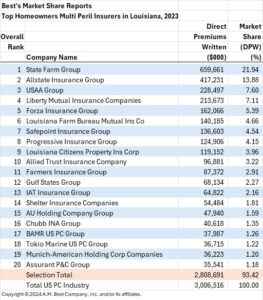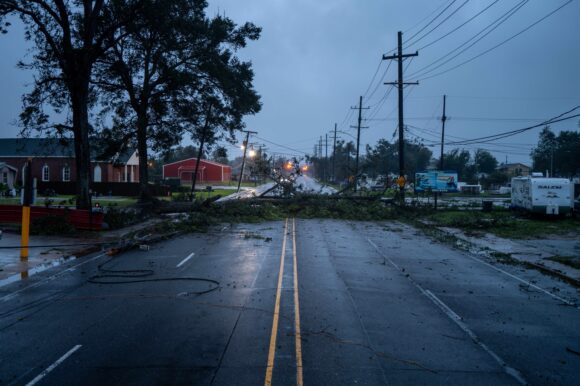Losses from Hurricane Francine are expected to be manageable for property/casualty insurers, with major population centers sparred from the worst of the storm’s damage.
Privately insured loss from Hurricane Francine are estimated to be close to $1.5 billion, catastrophe modeler Karen Clark & Co. said.
Moody’s Ratings said Francine’s losses on insures will be readily manageable. Primary insurers will retain most of the losses from the hurricane, the ratings agency said, adding that regionally focused carriers will be most affected.
 Francine made landfall in Terrebonne Parrish around 5:30 p.m. CST on Sept. 11 as a Category 2 hurricane with maximum sustained winds of 100 mph before weakening to a tropical storm the morning of Sept. 12 as it passed through Mississippi. The storm hit well to the west of New Orleans, which avoided damaging winds. Had New Orleans experienced wind damage, Francine would have led to a much higher loss event, KCC said.
Francine made landfall in Terrebonne Parrish around 5:30 p.m. CST on Sept. 11 as a Category 2 hurricane with maximum sustained winds of 100 mph before weakening to a tropical storm the morning of Sept. 12 as it passed through Mississippi. The storm hit well to the west of New Orleans, which avoided damaging winds. Had New Orleans experienced wind damage, Francine would have led to a much higher loss event, KCC said.
Louisiana, Terrebonne, Lafourche and Plaquemines Parishes experienced storm surge heights of over 4 feet along their coastline.
Moody’s expects that a significant portion of losses along the Louisiana Coast will be absorbed by Louisiana Citizens, the state-sponsored insurer of last resort. Louisiana Citizens does not offer flood insurance.
Moody’s added that P/C insurers face potential claims on private passenger and commercial vehicles, watercraft and other insured assets.
Industry ratings agency AM Best said it expects the majority of losses from Hurricane Francine to be borne by primary insurers given a shift toward higher reinsurance attachments. AM Best said the storm is being considered more of a flooding event than a wind event.
Best’s Commentary, Growing Gulf Coast-Focused Insurers Face Key Test in Hurricane Francine, noted there could be pockets of concentrations in which insurers with higher dependence on reinsurance could see greater impacts.
Francine is the sixth hurricane to make landfall in Louisiana in the last five years.
Photo: Houma, Louisiana, in the evening on Sept. 11.
Was this article valuable?
Here are more articles you may enjoy.



 Munich Re Unit to Cut 1,000 Positions as AI Takes Over Jobs
Munich Re Unit to Cut 1,000 Positions as AI Takes Over Jobs  Jury Finds Johnson & Johnson Liable for Cancer in Latest Talc Trial
Jury Finds Johnson & Johnson Liable for Cancer in Latest Talc Trial  AI Claim Assistant Now Taking Auto Damage Claims Calls at Travelers
AI Claim Assistant Now Taking Auto Damage Claims Calls at Travelers  Judge Tosses Buffalo Wild Wings Lawsuit That Has ‘No Meat on Its Bones’
Judge Tosses Buffalo Wild Wings Lawsuit That Has ‘No Meat on Its Bones’ 

